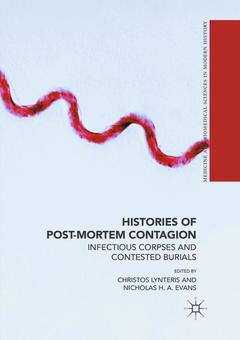Description
Histories of Post-Mortem Contagion, Softcover reprint of the original 1st ed. 2018
Infectious Corpses and Contested Burials
Medicine and Biomedical Sciences in Modern History Series
Coordinators: Lynteris Christos, Evans Nicholas H A
Language: English
Subjects for Histories of Post-Mortem Contagion:
Keywords
death; burial; mortuary practices; Ebola; disease; body; funeral; tradition; anthropology; Contagion; Post-Mortem
Publication date: 06-2019
230 p. · 14.8x21 cm · Paperback
Publication date: 01-2018
Support: Print on demand
Description
/li>Contents
/li>Biography
/li>Comment
/li>
This edited volume draws historians and anthropologists together to explore the contested worlds of epidemic corpses and their disposal. Why are burials so frequently at the center of disagreement, recrimination and protest during epidemics? Why are the human corpses produced in the course of infectious disease outbreaks seen as dangerous, not just to the living, but also to the continued existence of society and civilization? Examining cases from the Black Death to Ebola, contributors challenge the predominant idea that a single, universal framework of contagion can explain the political, social and cultural importance and impact of the epidemic corpse.
1. Introduction: The Challenge of the Epidemic Corpse, Christos Lynteris & Nicholas H A Evans.- 2. Failed Ritual? Medieval Papal Funerals and the Death of Clement VI (1352), Joëlle Rollo-Koster.- 3. Fear and the Corpse: Cholera and Plague Riots Compared, Samuel Cohn.- 4.Bloeming-typhoidtein: Epidemic Jingoism and the Typhoid Corpse in South Africa, Jacob Steere-Williams.- 5. Suspicious Corpses: Body Dumping and Plague in Colonial Hong Kong, Christos Lynteris.- 6. Composing and Decomposing Bodies: Visualizing Death and Disease in an Era of Global War, Pestilence, and Famine, 1913-23, Michael Anton Budd.- 7. Shrouded Corpses, Walking Cadavers: The Shifting of “the Choleras” in Depictions of Southeastern Captivity.
Christos Lynteris is Senior Lecturer in Social Anthropology at the University of St Andrews, UK, and Principal Investigator of the ERC-funded research project Visual Representations of the Third Plague Pandemic. He is the author of The Spirit of Selflessness in Maoist China (Palgrave, 2012) and Ethnographic Plague (Palgrave, 2016).
Nicholas H. A. Evansis a Fellow in the Department of Anthropology at the London School of Economics, UK. His work focuses on understanding the comparative and historical nature of doubt and uncertainty, and he was a member (2014-17) of the Visual Representations of the Third Plague Pandemic project at the University of Cambridge.
These books may interest you

Abused Bodies in Roman Epic 107.80 €



